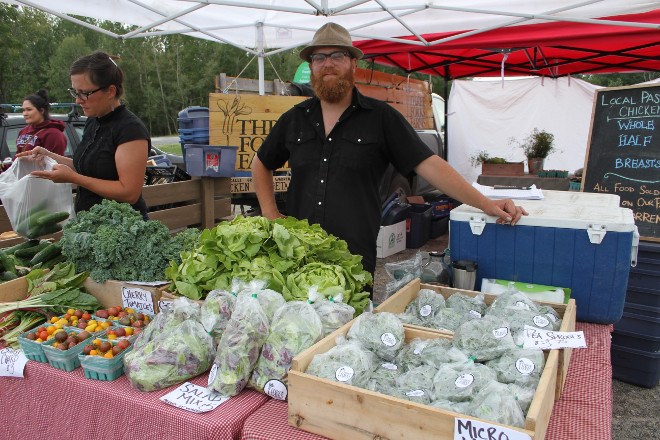As more people seek out healthier, fresher food, they are turning to both their backyards their local producers and becoming producers themselves.
One initiative gaining popularity is Community Supported Agriculture, or CSA. A CSA works by allowing people to pay a farmer shares in advance to grow their crops and the farmer is free to grow whatever they please. In return, the farmer provides the shareholders with fresh produce, usually on a weekly basis, often with vegetables and fruit a person wouldn't normally buy. Three Forks Farms, owned by Eric and Peggy Blondin and located in Warren, has been running a CSA for a few years. According to Eric, it's been a lot of work, but it has helped ease the financial burden and he's had a lot of fun educating people on different kinds of produce.
“It allows people to invest in a farm in the winter and in the summer they get a weekly box of food in the summer,” he said “The advance payment for a CSA share helps with the upfront costs, especially for new farms like mine in terms of cash flow to get seeds, supplies and keep a greenhouse running,” he said. “People make that investment into our farm, it gets our season going, and because we value those investments that people make, they get the first crack at the produce. We think of them as our VIPs,” he said.
They sell their produce at the Thursday afternoon market on Paris Street and the Saturday market on Elgin.
He explained that he and Peggy come up with a CSA schedule based on the growing season. They offer common items like onions, potatoes and leafy greens, but also grow what he called “odd-ball” vegetables to introduce them to a new market. He pointed out his kohlrabi, a bright green vegetable shaped like a large radish. He said it tastes a lot like a broccoli stem, but less bitter and fibrous. He researched the vegetable so he could tell his shareholders how to prepare it, which he said the best way was to cut it into sticks and saute. He also grows a squash called patty pans, small, round and tastes like a zucchini.
“This is a great way to introduce people to things people normally wouldn't see or buy,” he said.
It's also another outlet for those people seeking to buy local but can't grow their own. Eric explained they talk to their customers to determine what they like or want to try and take that into account when planning for the next growing season. There was an occasion where a vegetable they grew was so popular it sold out fast, but there was enough time in the growing season they replanted.
Demand for fresh produce is sparking a renaissance in local farming in the Sudbury region. There are many agriculture-related projects going on, from a garden-in-a-box, to community gardens, even families taking up farming. The region used to have a thriving agricultural scene, but it dwindled over the decades. Now, according to Lynn Despatie, business development officer for the City of Greater Sudbury, more young people and families are looking closer to home for their fresh produce.
“There's been a lot of farming going on, lately, and a lot of younger people going into it for many reasons,” she said. “We are seeing farmers who are really not interested in the Monday to Friday lifestyle and want to be their own boss and set their own hours. We are seeing a lot more business planning as well. In the past there was more monocropping, but now they are planting based on a business plan and know they need to diversify for their clients.”
She explained the clients she has are interested in growing good food, for themselves and the community.
There have been a lot of advancements in farming machinery and growing techniques. There is more access to tools like greenhouses and modular farms, where crops can be grown inside in vertical towers. On a smaller scale, there are more community gardens, balcony gardens and even rooftop gardens. As a mother, she said she understands the need to provide families with fresh produce.
While Sudbury is only a few hours from agricultural hubs in the south, often the produce grown there is picked early and spends a lot of time on trucks, losing flavour and nutrition.
“People are becoming more aware of how far their food travels,” she said. “I went to a supermarket and had six different apple varieties. One was from Canada, two from the U.S.A. and the rest were from New Zealand, that's crazy to me.”
For Eric, the CSA program for him has been a resounding success and he is keeping it going for the forseeable future.
“It's a whole different group of people that are interested and for us, it helps keep the farm running during the off-season,” he said. “It's a win-win for the customer/shareholder, and it's a win for us.”




